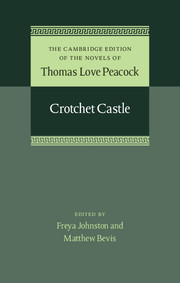Book contents
- Frontmatter
- Contents
- List of Illustrations
- General Editor’s Preface
- Acknowledgements
- Chronology
- List of Abbreviations
- Introduction
- Crotchet Castle
- Appendix A Peacock’s Preface of 1837
- Appendix B Holograph Fragment of Chapter 4 (c. 1830)
- Appendix C Holograph Fragment of Chapter 5 (c. 1830)
- Appendix D Holograph Manuscript of ‘Touchandgo’ (Watermark 1827)
- Appendix E Holograph Manuscript of ‘Touchandgo’ (Watermark 1828)
- Appendix F Holograph Fragment of Chapter 16 (c. 1830)
- Appendix G ‘The Fate of a Broom: An Anticipation’ (1831, 1837)
- Note on the Text
- Emendations and Variants
- Ambiguous Line-End Hyphenations
- Explanatory Notes
- Select Bibliography
Chapter III - The Roman Camp
Published online by Cambridge University Press: 30 June 2022
- Frontmatter
- Contents
- List of Illustrations
- General Editor’s Preface
- Acknowledgements
- Chronology
- List of Abbreviations
- Introduction
- Crotchet Castle
- Appendix A Peacock’s Preface of 1837
- Appendix B Holograph Fragment of Chapter 4 (c. 1830)
- Appendix C Holograph Fragment of Chapter 5 (c. 1830)
- Appendix D Holograph Manuscript of ‘Touchandgo’ (Watermark 1827)
- Appendix E Holograph Manuscript of ‘Touchandgo’ (Watermark 1828)
- Appendix F Holograph Fragment of Chapter 16 (c. 1830)
- Appendix G ‘The Fate of a Broom: An Anticipation’ (1831, 1837)
- Note on the Text
- Emendations and Variants
- Ambiguous Line-End Hyphenations
- Explanatory Notes
- Select Bibliography
Summary
He loved her more then seven yere,
Yet was he of her love never the nere;
He was not ryche of golde and fe,
A gentyll man forsoth was he.
The Squyr of Lowe Degre.THE Reverend Doctor Folliott having promised to return to dinner, walked back to his vicarage, meditating whether he should pass the morning in writing his next sermon, or in angling for trout, and had nearly decided in favor of the latter proposition, repeating to himself, with great unction, the lines of Chaucer:
And as for me, though that I can but lite,
On bokis for to read I me delite,
And to ‘hem yeve I faithe and full credence,
And in mine herte have ‘hem in reverence,
So hertily, that there is gamē none,
That fro my bokis makith me to gone,
But it be seldome, on the holie daie;
Save certainly whan that the month of Maie
Is comin, and I here the foulis sing,
And that the flouris ginnin for to spring,
Farwell my boke and my devocion:
when his attention was attracted by a young gentleman who was sitting on a camp stool with a portfolio on his knee, taking a sketch of the Roman Camp, which, as has been already said, was within the enclosed domain of Mr. Crotchet. The young stranger, who had climbed over the fence, espying the portly divine, rose up, and hoped that he was not trespassing. “By no means, sir,” said the divine, “all the arts and sciences are welcome here; music, painting, and poetry; hydrostatics, and political economy; meteorology, transcendentalism, and fish for breakfast.”
THE STRANGER.
A pleasant association, sir, and a liberal and discriminating hospitality. This is an old British camp, I believe, sir.
THE REV. DR. FOLLIOTT.
Roman, sir; Roman: undeniably Roman. The vallum is past controversy. It was not a camp, sir, a castrum, but a castellum, a little camp, or watch-station, to which was attached, on the peak of the adjacent hill, a beacon for transmitting alarms. You will find such here and there, all along the range of chalk hills, which traverses the country from north-east to south-west, and along the base of which runs the ancient Ikenild road, whereof you may descry a portion in that long strait white line.
- Type
- Chapter
- Information
- Crotchet Castle , pp. 23 - 33Publisher: Cambridge University PressPrint publication year: 2016

